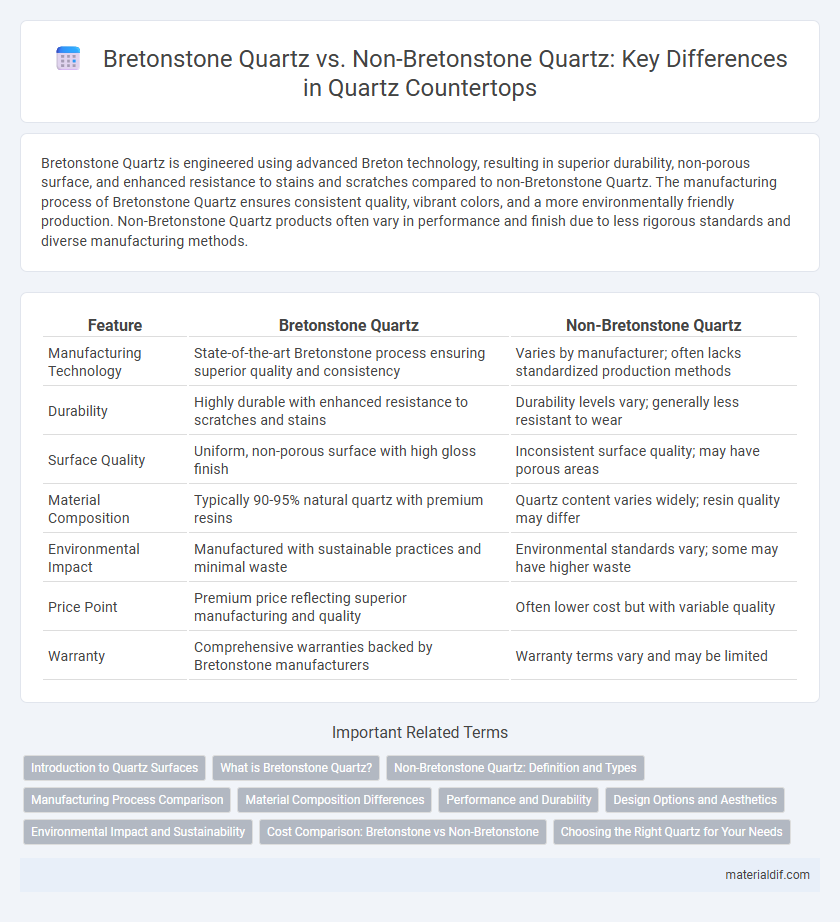Bretonstone Quartz is engineered using advanced Breton technology, resulting in superior durability, non-porous surface, and enhanced resistance to stains and scratches compared to non-Bretonstone Quartz. The manufacturing process of Bretonstone Quartz ensures consistent quality, vibrant colors, and a more environmentally friendly production. Non-Bretonstone Quartz products often vary in performance and finish due to less rigorous standards and diverse manufacturing methods.
Table of Comparison
| Feature | Bretonstone Quartz | Non-Bretonstone Quartz |
|---|---|---|
| Manufacturing Technology | State-of-the-art Bretonstone process ensuring superior quality and consistency | Varies by manufacturer; often lacks standardized production methods |
| Durability | Highly durable with enhanced resistance to scratches and stains | Durability levels vary; generally less resistant to wear |
| Surface Quality | Uniform, non-porous surface with high gloss finish | Inconsistent surface quality; may have porous areas |
| Material Composition | Typically 90-95% natural quartz with premium resins | Quartz content varies widely; resin quality may differ |
| Environmental Impact | Manufactured with sustainable practices and minimal waste | Environmental standards vary; some may have higher waste |
| Price Point | Premium price reflecting superior manufacturing and quality | Often lower cost but with variable quality |
| Warranty | Comprehensive warranties backed by Bretonstone manufacturers | Warranty terms vary and may be limited |
Introduction to Quartz Surfaces
Quartz surfaces, engineered from natural quartz crystals combined with resin and pigments, vary significantly between Bretonstone and non-Bretonstone products. Bretonstone quartz is manufactured using advanced Breton technology, offering superior durability, stain resistance, and uniformity compared to non-Bretonstone quartz, which often lacks consistent quality and performance standards. This distinction impacts applications in kitchen countertops, bathroom vanity tops, and commercial surfaces, where longevity and aesthetic appeal are critical.
What is Bretonstone Quartz?
Bretonstone Quartz is an engineered stone made from over 90% natural quartz combined with resins and pigments, produced through a high-pressure, high-temperature process developed by Breton S.p.A. This manufacturing technique enhances durability, stain resistance, and aesthetic consistency compared to non-Bretonstone quartz, which may use different fabrication methods and less stringent quality controls. Bretonstone Quartz surfaces are known for their superior hardness and versatility, making them ideal for kitchen countertops, bathroom vanities, and commercial applications.
Non-Bretonstone Quartz: Definition and Types
Non-Bretonstone quartz refers to engineered quartz surfaces produced by manufacturers other than Bretonstone, the pioneer of quartz technology. These types include various brands that use different resin formulas, quartz granule sizes, and manufacturing techniques, resulting in diverse aesthetic and performance characteristics. Common types of non-Bretonstone quartz offer options such as high-gloss, matte finishes, and custom colors, catering to a wide range of design applications and budgets.
Manufacturing Process Comparison
Bretonstone Quartz is produced using a high-pressure polymerization process that combines natural quartz with resins and pigments, resulting in a durable, non-porous surface resistant to stains and scratches. Non-Bretonstone Quartz often utilizes lower-pressure techniques, leading to less consistent density and reduced durability. This difference in manufacturing results in Bretonstone Quartz offering superior structural integrity and a longer lifespan compared to standard quartz surfaces.
Material Composition Differences
Bretonstone quartz is engineered using a proprietary process that combines over 90% natural quartz crystals with specialized resins and pigments, resulting in a denser and more durable surface compared to non-Bretonstone quartz. Non-Bretonstone quartz surfaces often contain a higher proportion of resin and fillers, which can affect their hardness, resistance to scratching, and overall longevity. The material composition difference directly impacts performance characteristics like stain resistance, heat tolerance, and maintenance requirements.
Performance and Durability
Bretonstone Quartz is engineered using a proprietary sintering and vibro-compression process that enhances its density and structural integrity, resulting in superior performance and durability compared to non-Bretonstone Quartz. Its high resistance to scratches, stains, and impact makes it ideal for heavy-use surfaces in kitchens and bathrooms. Non-Bretonstone Quartz, while still durable, generally lacks the same level of uniformity and strength, leading to relatively lower long-term resilience and maintenance demands.
Design Options and Aesthetics
Bretonstone Quartz offers a wider range of design options and superior aesthetics due to its advanced manufacturing process, which allows for consistent colors and intricate patterns. Non-Bretonstone Quartz typically features more limited design variety and less uniformity in appearance, often lacking the refined textures available in Bretonstone products. Homeowners and designers favor Bretonstone Quartz for its natural stone-like beauty and extensive customization possibilities.
Environmental Impact and Sustainability
Bretonstone Quartz stands out for its eco-friendly production process, utilizing up to 93% recycled natural quartz and employing environmentally responsible binding resins that reduce VOC emissions. Non-Bretonstone Quartz often relies on less sustainable materials and energy-intensive manufacturing methods, increasing its environmental footprint. The commitment of Bretonstone Quartz to sustainability certifications and waste reduction programs positions it as a superior choice for environmentally conscious consumers seeking durable and low-impact surfaces.
Cost Comparison: Bretonstone vs Non-Bretonstone
Bretonstone quartz typically costs more than non-Bretonstone quartz due to its proprietary manufacturing process that enhances durability and surface quality. Non-Bretonstone quartz varieties often come at lower price points but may lack the consistent performance and warranty coverage associated with Bretonstone products. Investing in Bretonstone quartz can yield long-term value through superior resistance to stains, scratches, and heat, justifying the initial higher expenditure.
Choosing the Right Quartz for Your Needs
Bretonstone quartz is engineered using a patented Bretonstone technology that combines natural quartz crystals with resin and pigments, resulting in a highly durable and non-porous surface ideal for countertops in kitchens and bathrooms. Non-Bretonstone quartz, while also composed of natural quartz, can vary significantly in quality, durability, and resin content, potentially impacting stain resistance and longevity. Choosing the right quartz depends on your specific requirements for hardness, maintenance, aesthetics, and budget, with Bretonstone quartz often favored for its consistent performance and premium manufacturing standards.
Bretonstone Quartz vs Non-Bretonstone Quartz Infographic

 materialdif.com
materialdif.com